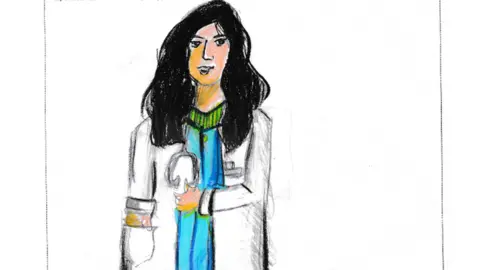Children in poorer countries have higher career aspirations than UK
 BBC
BBCYoung people in developing countries often have more aspirational career ambitions than boys in the UK, an international survey suggests.
While boys in the UK aimed to be footballers or YouTube stars, their counterparts in Uganda and Zambia wanted to be doctors or teachers.
The findings are from a survey of 20,000 children by the Education and Employers careers charity.
The results are to be presented to business leaders at Davos next week.
The study asked primary school children, aged seven to 11, in 20 countries to draw pictures of the jobs they wanted to have when they grew up.
Gender roles
The careers charity said the results showed how much gender stereotypes were established from an early age.
In the UK, girls were much less likely to want to become engineers or scientists.

But jobs such as nurse, dancer and hairdresser were among their top 10 ambitions.
And boys were more likely to want to have jobs such as airline pilot and mechanic.
Girls' top choices were more focused on academic success - with jobs such as teacher, vet and doctor among the most popular.
By contrast, boys seemed to be much more influenced by popular culture, with jobs such as sportsman, working in social media or the police.
Social mobility
In terms of social mobility, the charity said the survey showed young people needed to be introduced to different types of careers at an early age.
Girls in more deprived schools were more likely to want to be shop workers and beauty therapists, while better-off boys wanted to be managers and lawyers.

Outside of the UK, the drawings often showed high aspirations despite hardship.
In Uganda and the Philippines, girls most want to be teachers.
In Pakistan, Bangladesh, Colombia and Indonesia they want to be doctors.
In China, the most popular career ambition for boys is a scientist.

But across both the UK and international findings, there was a huge mismatch between the reality of the jobs market and the expectations of young people.
'Break the mould'
And the charity said this misalignment remained a problem for older pupils, with a lack of advice available about what skills were really going to be in demand.
"Careers counselling in secondary schools comes far too late," said the OECD's education director, Andreas Schleicher.
"It is clear from the drawings that children arrive in school with strong assumptions based on their own day-to-day experiences," said Mr Schleicher.

"The findings have implications for all of us seeking to improve social mobility," said David Cruickshank, global chairman of Deloitte and chair of trustees for Education and Employers.
"Children's career aspirations are most influenced by who they know," he said.
Anne Lyons, president of the National Association of Head Teachers, said it showed how hard it was for young people to "break the mould" of their families' expectations.
Nick Chambers, chief executive of Education and Employers, said it showed the need for children in primary school to hear about the "vast range of career options open to them and are not ruling things out at an early age".
Top 10 most popular jobs for girls in the UK
- Teacher
- Vet
- Sports player
- Doctor
- Artist
- Musician
- Hairdresser
- Scientist
- Dancer
- Nurse

Top 10 most popular jobs for boys in the UK
- Sports player
- Social media
- Police
- Armed forces
- Scientist
- Engineer
- Doctor
- Teacher
- Vet
- Mechanic
